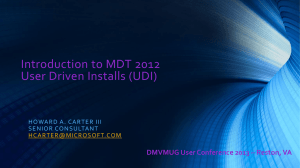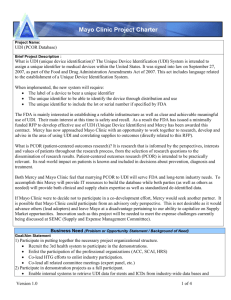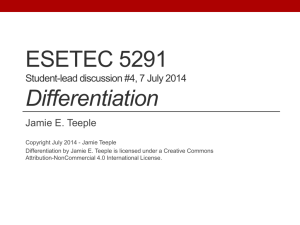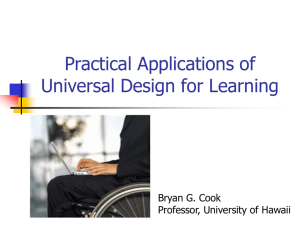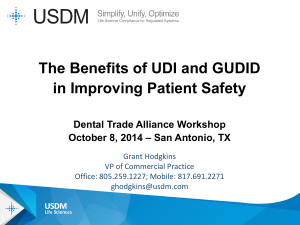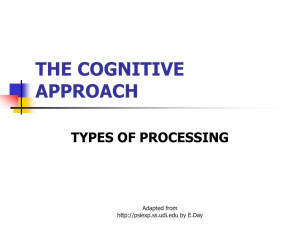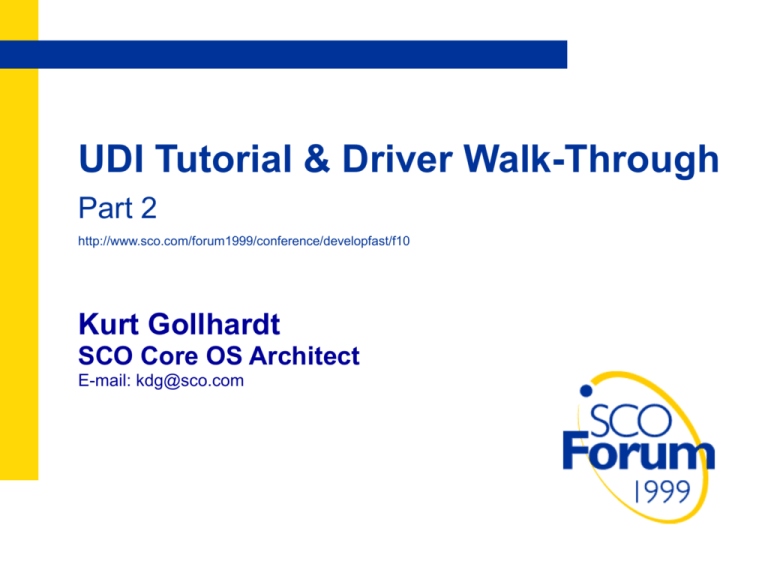
UDI Tutorial & Driver Walk-Through
Part 2
http://www.sco.com/forum1999/conference/developfast/f10
Kurt Gollhardt
SCO Core OS Architect
E-mail: kdg@sco.com
Overview
• Key Concepts
• Description of Sample Driver
• Walk-Through
• Additional Examples
• Hints & Tips
F10: UDI Tutorial & Driver Walk-Through, Part 2
© 1999 SCO All Rights Reserved - Slide 2
Walk-Through
udi_cmos.c lines 243-248
• Primary region initialization
243
244
245
246
247
248
static const udi_primary_init_t
udi_cmos_primary_init_info = {
&cmos_mgmt_ops,
0,
/* mgmt_scratch_size */
0,
/* no children, so no enumeration */
sizeof(cmos_region_data_t)
};
F10: UDI Tutorial & Driver Walk-Through, Part 2
© 1999 SCO All Rights Reserved - Slide 3
Walk-Through
udi_cmos.c lines 255-285
• Channel ops initialization
255
256
257
258
260
261
262
263
static const udi_ops_init_t
udi_cmos_ops_init_list[] = {
{
GIO_OPS_IDX,
CMOS_GIO_META,
UDI_GIO_PROVIDER_OPS_NUM,
0,
/* no channel context */
(udi_ops_vector_t *)
&cmos_gio_provider_ops
}, ...
F10: UDI Tutorial & Driver Walk-Through, Part 2
© 1999 SCO All Rights Reserved - Slide 4
Walk-Through
udi_cmos.c lines 292-346
• Control block initialization
292
293
294
295
296
297
298
299
300
static const udi_cb_init_t
udi_cmos_cb_init_list[] = {
{
GIO_BIND_CB_IDX,
CMOS_GIO_META,
UDI_GIO_BIND_CB_NUM,
GIO_BIND_SCRATCH,
0,
/* inline size
*/
NULL
/* inline layout */
}, ...
F10: UDI Tutorial & Driver Walk-Through, Part 2
© 1999 SCO All Rights Reserved - Slide 5
Walk-Through
udi_cmos.c lines 348-355
• Driver initialization structure
348
349
350
351
352
353
354
355
const udi_init_t udi_init_info = {
&udi_cmos_primary_init_info,
NULL,
/* secondary_init_list */
udi_cmos_ops_init_list,
udi_cmos_cb_init_list,
NULL,
/* gcb_init_list */
NULL
/* cb_select_list */
};
• udi_init_info is only well-known global name
F10: UDI Tutorial & Driver Walk-Through, Part 2
© 1999 SCO All Rights Reserved - Slide 6
Walk-Through
udi_cmos.c lines 365-381
• Handle channel events from parent (bridge)
365
366
367
368
369
370
371
372
373
374
375
378
379
380
381
static void
cmos_parent_channel_event(udi_channel_event_cb_t *channel_event_cb)
{
switch (channel_event_cb->event) {
case UDI_CHANNEL_BOUND:
/* Allocate a bus bind control block. */
udi_cb_alloc(cmos_bind_to_parent_1,
UDI_GCB(channel_event_cb),
BUS_BIND_CB_IDX,
channel_event_cb->gcb.channel);
break;
default:
udi_channel_event_complete(channel_event_cb, UDI_OK);
}
}
F10: UDI Tutorial & Driver Walk-Through, Part 2
© 1999 SCO All Rights Reserved - Slide 7
Walk-Through
udi_cmos.c lines 384-396
• Continue bind sequence after allocation
384
385
386
387
388
389
390
391
392
393
394
395
396
cmos_bind_to_parent_1(
udi_cb_t *gcb,
udi_cb_t *new_cb)
{
udi_bus_bind_cb_t *bus_bind_cb =
UDI_MCB(new_cb, udi_bus_bind_cb_t);
/* Keep a link back to the channel event CB for the ack. */
bus_bind_cb->gcb.initiator_context = gcb;
/* Bind to the parent bus bridge driver. */
udi_bus_bind_req(bus_bind_cb);
}
F10: UDI Tutorial & Driver Walk-Through, Part 2
© 1999 SCO All Rights Reserved - Slide 8
Walk-Through
udi_cmos.c lines 400-429
• Received ack from bridge; map PIO device
400
401
402
403
404
405
406
418
424
425
426
427
428
429
static void
cmos_bus_bind_ack(
udi_bus_bind_cb_t *bus_bind_cb,
udi_ubit8_t preferred_endianness,
udi_status_t status)
{
cmos_region_data_t *rdata = bus_bind_cb->gcb.context;
rdata->bus_bind_cb = bus_bind_cb;
udi_pio_map(cmos_bus_bind_ack_1, UDI_GCB(bus_bind_cb),
CMOS_REGSET, CMOS_BASE, CMOS_LENGTH,
cmos_trans_read,
sizeof cmos_trans_read /
sizeof(udi_pio_trans_t),
UDI_PIO_STRICTORDER, CMOS_PACE);
}
F10: UDI Tutorial & Driver Walk-Through, Part 2
© 1999 SCO All Rights Reserved - Slide 9
Walk-Through
udi_cmos.c lines 434-448
• Map second PIO handle (2 trans lists)
434
435
436
437
438
441
442
443
444
445
446
447
448
cmos_bus_bind_ack_1(
udi_cb_t *gcb,
udi_pio_handle_t new_pio_handle)
{
cmos_region_data_t *rdata = gcb->context;
rdata->trans_read = new_pio_handle;
udi_pio_map(cmos_bus_bind_ack_2, gcb,
CMOS_REGSET, CMOS_BASE, CMOS_LENGTH,
cmos_trans_write,
sizeof cmos_trans_write /
sizeof(udi_pio_trans_t),
UDI_PIO_STRICTORDER, CMOS_PACE);
}
F10: UDI Tutorial & Driver Walk-Through, Part 2
© 1999 SCO All Rights Reserved - Slide 10
Walk-Through
udi_cmos.c lines 451-468
• Bind sequence complete
451
452
453
454
455
456
457
458
459
460
465
466
467
468
cmos_bus_bind_ack_2(
udi_cb_t *gcb,
udi_pio_handle_t new_pio_handle)
{
cmos_region_data_t *rdata = gcb->context;
udi_channel_event_cb_t *channel_event_cb =
gcb->initiator_context;
/* Save the PIO handle for later use. */
rdata->trans_write = new_pio_handle;
/* Let the MA know we've completed binding. */
udi_channel_event_complete(channel_event_cb, UDI_OK);
}
F10: UDI Tutorial & Driver Walk-Through, Part 2
© 1999 SCO All Rights Reserved - Slide 11
Walk-Through
udi_cmos.c lines 470-480
• Child bind and unbind
– This driver has no per-child state
470
471
472
473
474
475
476
477
478
479
480
static void
cmos_gio_bind_req(udi_gio_bind_cb_t *gio_bind_cb)
{
udi_gio_bind_ack(gio_bind_cb, CMOS_DEVSIZE, 0, UDI_OK);
}
static void
cmos_gio_unbind_req(udi_gio_bind_cb_t *gio_bind_cb)
{
udi_gio_unbind_ack(gio_bind_cb);
}
F10: UDI Tutorial & Driver Walk-Through, Part 2
© 1999 SCO All Rights Reserved - Slide 12
Walk-Through
udi_cmos.c lines 492-508
• Transfer request operation - READ case
492
493
494
495
501
502
503
504
505
506
507
508
cmos_gio_xfer_req(udi_gio_xfer_cb_t *gio_xfer_cb)
{
udi_gio_rw_params_t *rw_params = gio_xfer_cb->tr_params;
switch (gio_xfer_cb->op) {
case UDI_GIO_OP_READ:
udi_assert(rw_params->offset_hi == 0 &&
rw_params->offset_lo < CMOS_DEVSIZE &&
gio_xfer_cb->data_buf->buf_size <
CMOS_DEVSIZE - rw_params->offset_lo);
cmos_do_read(gio_xfer_cb, rw_params->offset_lo);
break;
F10: UDI Tutorial & Driver Walk-Through, Part 2
© 1999 SCO All Rights Reserved - Slide 13
Walk-Through
udi_cmos.c lines 509-519
• Transfer request operation - WRITE case
509
510
511
512
513
514
515
case UDI_GIO_OP_WRITE:
udi_assert(rw_params->offset_hi == 0 &&
rw_params->offset_lo < CMOS_DEVSIZE &&
gio_xfer_cb->data_buf->buf_size <
CMOS_DEVSIZE - rw_params->offset_lo);
cmos_do_write(gio_xfer_cb, rw_params->offset_lo);
break;
• Transfer request operation - error case
516
517
518
519
default:
udi_gio_xfer_nak(gio_xfer_cb, UDI_STAT_NOT_UNDERSTOOD);
}
}
F10: UDI Tutorial & Driver Walk-Through, Part 2
© 1999 SCO All Rights Reserved - Slide 14
Walk-Through
udi_cmos.c lines 525-541
• Initiate PIO transactions for READ request
525
526
527
528
529
530
535
536
537
538
539
540
541
cmos_do_read(udi_gio_xfer_cb_t *gio_xfer_cb, udi_ubit8_t addr)
{
cmos_region_data_t *rdata = gio_xfer_cb->gcb.context;
cmos_gio_xfer_scratch_t *gio_xfer_scratch =
gio_xfer_cb->gcb.scratch;
gio_xfer_scratch->addr = addr;
gio_xfer_scratch->count = gio_xfer_cb->data_buf->buf_size;
udi_pio_trans(cmos_do_read_1, gcb,
rdata->trans_read,
new_buf, NULL);
}
F10: UDI Tutorial & Driver Walk-Through, Part 2
© 1999 SCO All Rights Reserved - Slide 15
Walk-Through
udi_cmos.c lines 544-560
• Complete READ request
544
545
546
547
548
549
550
551
552
553
554
555
556
557
558
559
560
cmos_do_read_1(
udi_cb_t *gcb,
udi_buf_t *new_buf,
udi_status_t status,
udi_ubit16_t result)
{
udi_gio_xfer_cb_t *gio_xfer_cb =
UDI_MCB(gcb, udi_gio_xfer_cb_t);
/* udi_pio_trans may create a new buffer. */
gio_xfer_cb->data_buf = new_buf;
if (status == UDI_OK)
udi_gio_xfer_ack(gio_xfer_cb);
else
udi_gio_xfer_nak(gio_xfer_cb, status);
}
F10: UDI Tutorial & Driver Walk-Through, Part 2
© 1999 SCO All Rights Reserved - Slide 16
Walk-Through
udi_cmos.c lines 566-613
• WRITE case identical to READ except:
– Uses trans_write instead of trans_read
– Special case for CMOS driver:
572
573
574
575
576
577
578
579
580
581
/*
* The first CMOS_RDONLY_SZ bytes of this device are not
* allowed to be written through this driver. Fail any
* attempt to write to these bytes.
*/
if (addr < CMOS_RDONLY_SZ) {
udi_gio_xfer_nak(gio_xfer_cb,
UDI_STAT_MISTAKEN_IDENTITY);
return;
}
F10: UDI Tutorial & Driver Walk-Through, Part 2
© 1999 SCO All Rights Reserved - Slide 17
Walk-Through
udi_cmos.c lines 615-636
• Device Management - unbind from parent
616
617
618
620
621
623
624
628
629
631
632
633
634
635
636
cmos_devmgmt_req(
udi_mgmt_cb_t *cb,
udi_ubit8_t mgmt_op, udi_ubit8_t parent_id)
{
cmos_region_data_t *rdata = cb->gcb.context;
switch (mgmt_op) {
case UDI_DMGMT_UNBIND:
/* Keep a link back to this CB for use in the ack */
rdata->bus_bind_cb->gcb.initiator_context = cb;
/* Do the metalanguage-specific unbind. */
udi_bus_unbind_req(rdata->bus_bind_cb);
default:
udi_devmgmt_ack(cb, 0, UDI_OK);
}
}
F10: UDI Tutorial & Driver Walk-Through, Part 2
© 1999 SCO All Rights Reserved - Slide 18
Walk-Through
udi_cmos.c lines 639-646
• Complete parent unbind sequence
639
640
641
642
643
644
645
646
cmos_bus_unbind_ack(udi_bus_bind_cb_t *bus_bind_cb)
{
udi_mgmt_cb_t *cb = bus_bind_cb->gcb.initiator_context;
udi_cb_free(UDI_GCB(bus_bind_cb));
udi_devmgmt_ack(cb, 0, UDI_OK);
}
F10: UDI Tutorial & Driver Walk-Through, Part 2
© 1999 SCO All Rights Reserved - Slide 19
Walk-Through
udi_cmos.c lines 384-396
• Final cleanup
– Called after all children/parents unbound
649
650
651
652
653
654
655
656
cmos_final_cleanup_req(udi_mgmt_cb_t *cb)
{
/*
* We have nothing to free that wasn't already freed by
* unbinding children and parents.
*/
udi_final_cleanup_ack(cb);
}
F10: UDI Tutorial & Driver Walk-Through, Part 2
© 1999 SCO All Rights Reserved - Slide 20
PIO Transaction List for READ
udi_cmos.c lines 174-185
174
175
176
177
178
179
180
181
182
183
184
185
/* R0 <- SCRATCH_ADDR {offset into scratch of address} */
{ UDI_PIO_LOAD_IMM+UDI_PIO_R0, UDI_PIO_2BYTE, SCRATCH_ADDR },
/* R1 <- address */
{ UDI_PIO_LOAD+UDI_PIO_SCRATCH+UDI_PIO_R0,
UDI_PIO_1BYTE, UDI_PIO_R1 },
/* R0 <- SCRATCH_COUNT {offset into scratch of count} */
{ UDI_PIO_LOAD_IMM+UDI_PIO_R0, UDI_PIO_2BYTE, SCRATCH_COUNT },
/* R2 <- count */
{ UDI_PIO_LOAD+UDI_PIO_SCRATCH+UDI_PIO_R0,
UDI_PIO_1BYTE, UDI_PIO_R2 },
/* R0 <- 0 {current buffer offset} */
{ UDI_PIO_LOAD_IMM+UDI_PIO_R0, UDI_PIO_2BYTE, 0 },
F10: UDI Tutorial & Driver Walk-Through, Part 2
© 1999 SCO All Rights Reserved - Slide 21
PIO Transaction List for READ
udi_cmos.c lines 186-203
186
187
188
189
190
191
192
193
194
195
196
197
198
199
200
201
202
203
/* begin main loop */
{ UDI_PIO_LABEL, 0, 1 },
/* output address from R1 to address register */
{ UDI_PIO_OUT+UDI_PIO_DIRECT+UDI_PIO_R1,
UDI_PIO_1BYTE, CMOS_ADDR },
/* input value from data register into next buffer location */
{ UDI_PIO_IN+UDI_PIO_BUF+UDI_PIO_R0,
UDI_PIO_1BYTE, CMOS_DATA },
/* decrement count (in R2) */
{ UDI_PIO_ADD_IMM+UDI_PIO_R2, UDI_PIO_1BYTE, (udi_ubit8_t)-1 },
/* if count is zero, we're done */
{ UDI_PIO_CSKIP+UDI_PIO_R2, UDI_PIO_1BYTE, UDI_PIO_NZ },
{ UDI_PIO_END, UDI_PIO_2BYTE, 0 },
/* increment address and buffer offset */
{ UDI_PIO_ADD_IMM+UDI_PIO_R1, UDI_PIO_1BYTE, 1 },
{ UDI_PIO_ADD_IMM+UDI_PIO_R0, UDI_PIO_1BYTE, 1 },
/* go back to main loop */
{ UDI_PIO_BRANCH, 0, 1 }
F10: UDI Tutorial & Driver Walk-Through, Part 2
© 1999 SCO All Rights Reserved - Slide 22
Additional Examples
Memory Allocation
• Asynchronous service call
udi_mem_alloc(callback, gcb, size, UDI_MEM_NOZERO);
• Callback
static void callback(
udi_cb_t *gcb,
void *new_mem )
{
/* continue */
}
F10: UDI Tutorial & Driver Walk-Through, Part 2
© 1999 SCO All Rights Reserved - Slide 23
Additional Examples
Memory Allocation - Limits
• Size > limits.max_safe_alloc
– Driver must cancel allocation if it takes too long
» Start timer with udi_timer_start
» Cancel allocation with udi_cancel
» On success, cancel timer w/ udi_timer_cancel
• Size <= UDI_MIN_ALLOC_LIMIT
– Don’t need runtime test
F10: UDI Tutorial & Driver Walk-Through, Part 2
© 1999 SCO All Rights Reserved - Slide 24
Additional Examples
Timers
• Timer interval stored as udi_time_t
– Seconds, nanoseconds
udi_time_t interval = { 0, 1000000 };
udi_timer_start(callback, gcb, interval);
• Timer callback
static void callback(gcb);
• Cancelling a timer
udi_timer_cancel(gcb);
F10: UDI Tutorial & Driver Walk-Through, Part 2
© 1999 SCO All Rights Reserved - Slide 25
Hints & Tips
• For debugging, try udi_debug_break().
• To print debug info, use udi_trace_write().
• Don’t forget to cancel pending timers during
unbinding.
• Keep pools of control blocks and buffers instead
of allocating new ones for each request.
F10: UDI Tutorial & Driver Walk-Through, Part 2
© 1999 SCO All Rights Reserved - Slide 26
Presenter’s Notes Cover Page
Go to “Notes Page View” to see this one
Put this page at end of presentation so numbering
of slides will remain accurate.

